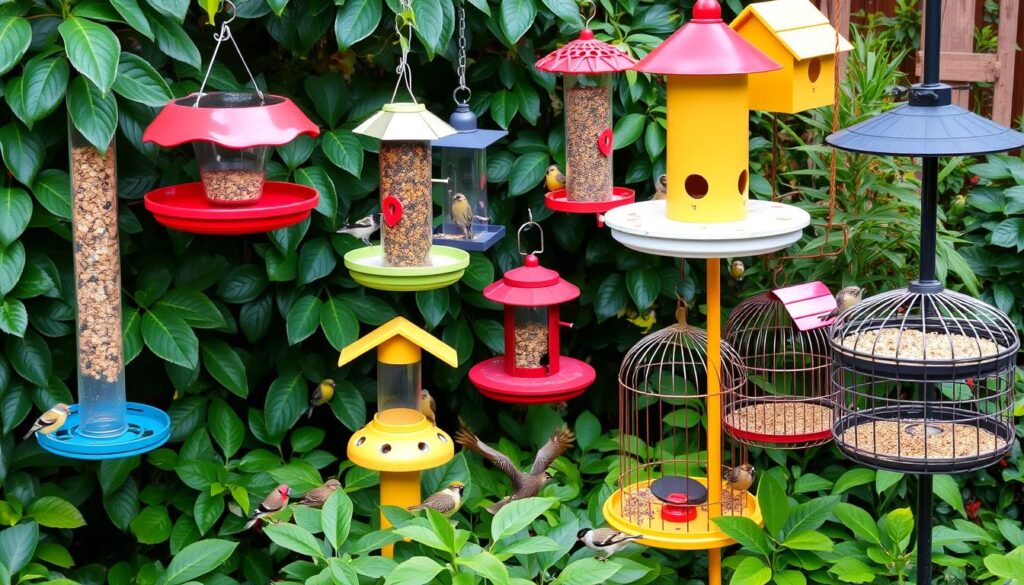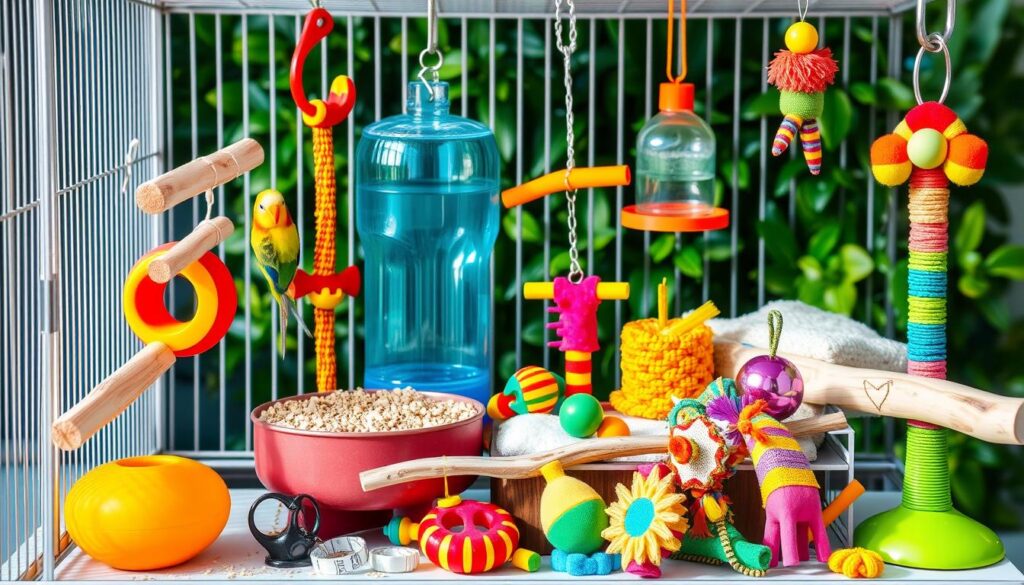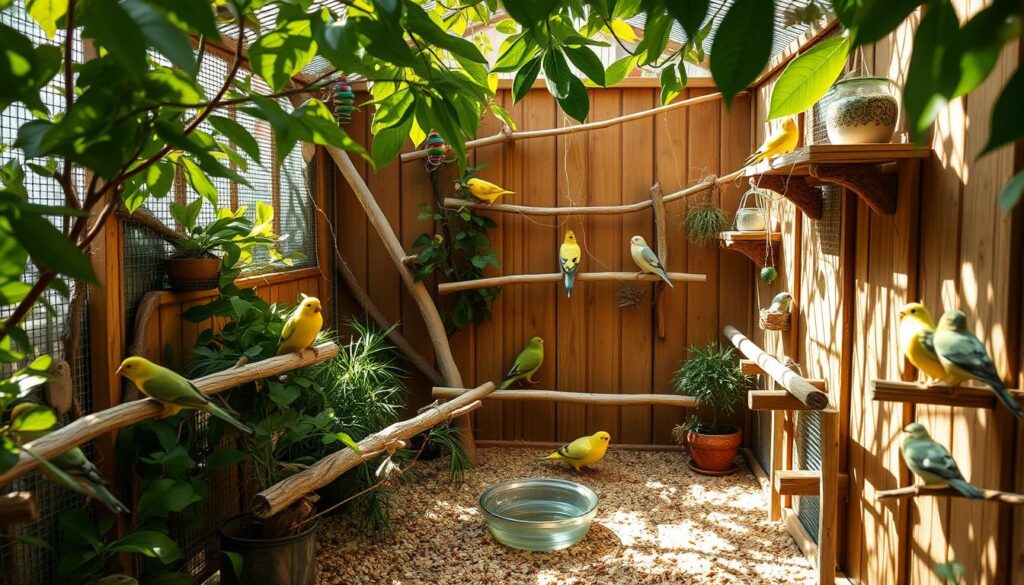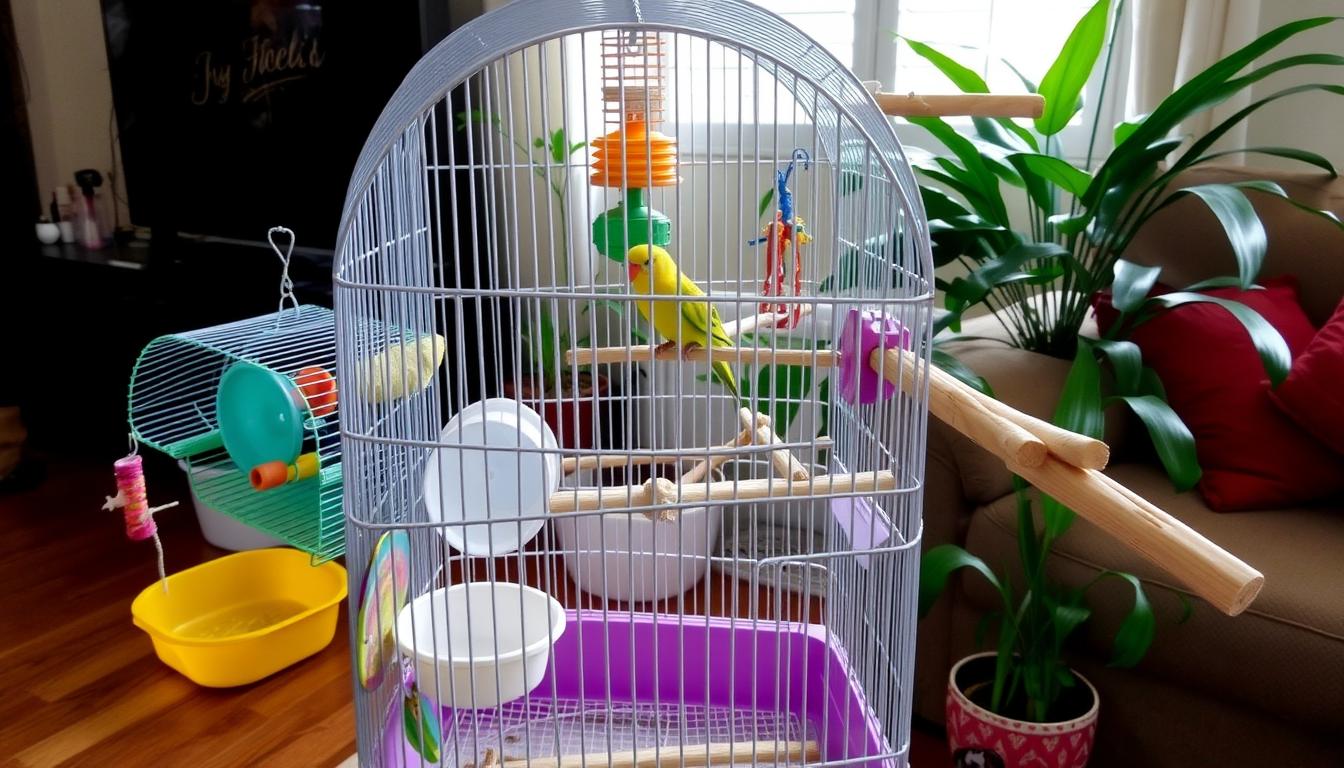Preparing to welcome a feathered friend into your home? The Bird Starter Home Kit is the ultimate solution to create a comfortable, safe, and engaging environment for your new pet. But have you considered all the essential elements that make a bird’s habitat truly exceptional? From the perfect cage size to the right perch materials, the details matter more than you might think.
Key Takeaways
- The Bird Starter Home Kit provides everything you need to set up a suitable home for your new pet bird.
- Choosing the right cage size, perches, food and water bowls, and toys is crucial for your bird’s well-being.
- Creating a comfortable and stimulating environment with proper bedding, temperature, and lighting is key.
- Ensuring your bird receives a balanced diet and engaging playtime is essential for their physical and mental health.
- Proper care and maintenance, including regular cleaning and grooming, will help your feathered friend thrive.
Why Choose a Bird as a Pet?
Birds make excellent companions for a variety of reasons. As intelligent and social creatures, they can form strong bonds with their owners, providing companionship, entertainment, and even helping to reduce stress. Unlike some other pets, birds are relatively low-maintenance, making them a suitable choice for busy families or individuals.
Benefits of Having Birds
One of the primary benefits of owning a bird is their inherent intelligence. Many bird species, such as parrots and cockatoos, have the ability to learn tricks, mimic sounds, and even engage in conversations with their owners. This level of interactivity can be highly rewarding and fulfilling for bird owners.
Ideal for Families and Individuals
Birds are also an excellent choice for those with limited living space, as they don’t require the same amount of room as larger pets. Their compact size and adaptability make them well-suited for apartments, condos, or homes with smaller square footage. Whether you’re a family or an individual, a bird can provide a unique and engaging companion.
Uniquely Engaging Companions
Beyond their intelligence and suitability for various living situations, birds offer a distinctive level of entertainment and engagement. Their vibrant colors, playful behaviors, and ability to interact with their owners make them truly unique and captivating companions. Watching a bird explore its environment, play with toys, or even engage in conversations can be a source of endless fascination and joy.
“Birds are not only beautiful to look at, but they also provide a level of companionship and entertainment that is truly unmatched by other pets.”
In conclusion, birds make excellent pets for a variety of reasons, from their intelligence and social nature to their suitability for different living spaces and their ability to engage and delight their owners. If you’re considering adding a feathered friend to your family, be sure to research the specific needs and care requirements of the bird species you’re interested in to ensure a fulfilling and rewarding experience.
Understanding Bird Needs
Caring for a pet bird goes beyond simply providing a cage and basic necessities. To ensure the well-being and happiness of your feathered friend, it’s essential to understand their specific needs. From social interaction to proper nutrition and mental stimulation, addressing these key aspects will create a thriving environment for your bird feeders, aviary essentials, and bird supplies.
Social Interaction and Attention
Birds are highly social creatures that crave interaction and attention from their owners. They thrive on regular playtime, cuddles, and positive reinforcement. Neglecting these social needs can lead to behavioral issues and even health problems. Allocate time each day to engage with your bird, whether it’s teaching them tricks, allowing them to perch on your finger, or simply talking to them.
Proper Nutrition and Diet
A balanced and varied diet is crucial for the well-being of your pet bird. Depending on the species, their dietary needs may include a mix of high-quality bird feeders, fresh fruits and vegetables, and specialized supplements. Consult with an avian veterinarian or experienced bird owner to ensure you are providing the appropriate aviary essentials and bird supplies for your bird’s nutritional requirements.
Mental Stimulation and Toys
Birds are intelligent creatures that require mental stimulation to prevent boredom and behavioral issues. Provide a variety of toys, puzzles, and environmental enrichment to keep your feathered friend engaged and entertained. Rotate the bird supplies regularly to prevent monotony and encourage natural foraging and exploratory behaviors.
By understanding and addressing these key needs, you can create a nurturing and enriching environment for your pet bird, fostering a strong bond and ensuring their overall well-being.
Types of Birds for Beginners
For new bird owners, certain species are more suitable due to their temperament and care requirements. Parakeets, cockatiels, and lovebirds are often considered ideal choices for beginners, as they tend to be friendly, adaptable, and relatively easy to care for.
Parakeets: Colorful and Friendly
Parakeets, also known as budgies, are a popular choice for pet bird enthusiasts. These small, vibrant birds come in a variety of colors, including green, blue, yellow, and white. Parakeets are known for their friendly and social nature, making them an excellent option for first-time bird owners. They are relatively easy to care for and can learn simple tricks, further enhancing the bond between bird and owner.
Cockatiels: Playful Personalities
Cockatiels are another popular species for beginner bird owners. These medium-sized birds are known for their playful and inquisitive personalities. Cockatiels can be taught to whistle, mimic sounds, and even perform basic tricks, making them engaging and interactive pets. They are generally calm and gentle, adapting well to domestic environments and forming strong bonds with their owners.
Lovebirds: Charming Companions
Lovebirds are small, vibrant birds that are often considered excellent choices for beginners. As their name suggests, lovebirds are known for their affectionate nature and tendency to bond closely with their owners. These birds are curious, active, and can learn to enjoy interacting with their human companions. Lovebirds come in a variety of color morphs, adding to their visual appeal.
When it comes to pet bird care, these three species – parakeets, cockatiels, and lovebirds – are often recommended for their suitability for avian housing and bird nests. Their friendly dispositions, adaptability to domestic environments, and relatively straightforward care requirements make them excellent options for those new to the world of bird ownership.
Essential Components of a Bird Starter Home Kit
Creating a comfortable and enriching environment for your feathered friend is crucial when welcoming a new bird into your home. The bird starter home kit should include several essential components to ensure your bird’s well-being and provide a solid foundation for a rewarding pet-owner relationship.
Cage Selection: Size and Style
The cage is the centerpiece of your bird’s habitat. Choose a cage that is appropriately sized for the species, allowing your bird ample space to move around, spread its wings, and perch comfortably. Consider the cage’s style, opting for one with multiple levels, ladders, and ample space for toys and accessories.
Bird Perches: Materials and Placement
Providing a variety of perches is essential for your bird’s foot health and natural behaviors. Include perches made of different materials, such as wood, rope, and concrete, to encourage foot strengthening and prevent bumblefoot. Strategically place the perches to create an engaging and interactive environment for your feathered friend.
Food and Water Bowls: Choosing the Right Ones
Selecting the right food and water bowls is critical for your bird’s nutrition and hydration. Opt for bowls made of bird-safe materials, such as ceramic or stainless steel, that are easily accessible and easy to clean. Ensure the bowls are securely attached to the cage to prevent spills and maintain a tidy habitat.
By carefully curating the essential components of a bird starter home kit, you can provide your new avian companion with a comfortable, stimulating, and safe environment to thrive. Remember, the key to a happy and healthy bird is a well-equipped and meticulously designed home.
“A well-designed bird habitat is the foundation for a fulfilling and rewarding pet-owner relationship.”
Creating a Comfortable Bird Habitat
Providing your feathered friend with a cozy and secure environment is crucial for their well-being. The right bedding, temperature, and lighting can make all the difference in creating a bird habitat that meets their unique needs.
Importance of Proper Bedding
When it comes to bird habitats, the bedding you choose plays a vital role. Opt for materials like newspaper or specialized cage liners that are easy to clean and maintain. This helps keep the environment hygienic and reduces the risk of bacterial buildup. Avoid using aromatic or scented litters, as they can be harmful to your bird’s delicate respiratory system.
Temperature and Lighting Needs
Birds require specific temperature ranges and lighting conditions to thrive. Ensure the cage is placed away from drafts and direct sunlight, as sudden changes in temperature can be stressful for your feathered friend. Provide appropriate lighting, whether it’s natural daylight or a specialized bird-safe lamp, to mimic their natural circadian rhythms and promote optimal health.
Safe Environment: Hazard Prevention
Creating a safe haven for your bird involves identifying and eliminating potential hazards. Remove any toxic plants from the immediate vicinity, and be mindful of Teflon-coated cookware, which can release fumes that are harmful to birds. Secure windows and doors to prevent your winged companion from escaping, and make sure the cage is sturdy and secure.
By addressing the essential elements of a comfortable bird habitat, you can ensure your feathered friend thrives in their new home, enjoying a safe, healthy, and enriching environment.
Nutrition Essentials for Your New Bird
Providing your feathered friend with a balanced and nutritious diet is crucial for their overall health and well-being. As a new bird owner, it’s important to understand the essential components of a proper bird diet.
Choosing the Right Bird Seeds
Bird seeds should be the foundation of your bird’s diet. Look for high-quality, all-natural seed mixes that cater to your bird’s specific species and needs. Avoid mixes with excessive fillers or low-quality ingredients that may lack the necessary vitamins and minerals.
Fresh Fruits and Vegetables
In addition to a quality seed mix, your bird will benefit greatly from a variety of fresh fruits and vegetables. These nutrient-dense foods provide essential vitamins, minerals, and fiber to support your bird’s overall health. Be sure to research which produce items are safe for your bird to consume.
Supplements for Optimal Health
Depending on your bird’s species and individual needs, supplements may be necessary to ensure they receive all the necessary nutrients. Consult with an avian veterinarian to determine if your bird requires any additional supplements, such as calcium, vitamins, or minerals, to maintain optimal health.
| Nutrient | Importance | Good Sources |
|---|---|---|
| Calcium | Supports strong bones and eggshell formation | Leafy greens, cuttlebone, calcium supplements |
| Vitamin A | Promotes healthy vision, immune function, and feather growth | Sweet potatoes, carrots, dark leafy greens |
| Vitamin D3 | Aids in calcium absorption and bone health | Sunlight exposure, bird-specific supplements |
| Protein | Supports muscle development and overall health | Seeds, nuts, cooked eggs, lean meats |
Remember, the specific dietary needs of your bird may vary, so always consult with an avian veterinarian to develop the best nutrition plan for your feathered companion.

Fun and Engaging Bird Toys
As a bird owner, providing your feathered friend with a variety of entertaining and stimulating toys is essential for their overall well-being. Bird accessories, aviary essentials, and a diverse selection of bird supplies can significantly enhance your bird’s quality of life and strengthen the bond between you and your pet.
Types of Toys: Chew, Swing, and Climb
Birds are naturally curious and love to explore their surroundings. Offer them a range of toys that cater to their innate behaviors, such as chewing, swinging, and climbing. Chew toys made from natural materials like wood, paper, or mineral blocks allow your bird to satisfy their need to gnaw and keep their beak healthy. Swinging perches and hanging toys provide opportunities for playful exercise, while ladders, ropes, and climbing structures encourage physical activity and mental stimulation.
Benefits of Interactive Play
Engaging your bird in interactive playtime with their toys not only keeps them entertained but also helps build trust and strengthen the bond between you and your feathered companion. When you participate in their playtime, your bird learns to associate you with positive experiences, leading to a more affectionate and responsive relationship.
Rotating Toys to Prevent Boredom
To prevent your bird from becoming bored, it’s essential to rotate their toys regularly. Introducing new and different bird accessories, aviary essentials, and bird supplies on a regular basis will keep your bird engaged and curious, preventing them from becoming disinterested or anxious. By providing a constantly changing environment, you can ensure your bird’s mental and physical well-being remain stimulated and enriched.
Remember, investing in high-quality, safe, and appropriate bird toys is a crucial aspect of caring for your feathered friend. By offering a variety of engaging accessories, you can create a stimulating and enjoyable environment that will keep your bird happy, healthy, and entertained.
Proper Bird Care and Maintenance
Responsible pet bird ownership requires dedicated care and maintenance to ensure your feathered friend’s health and well-being. Regularly cleaning the cage, grooming, and scheduling check-ups with an avian veterinarian are essential steps in providing exceptional pet bird care.
Cleaning the Cage and Accessories
Maintaining a clean and hygienic environment is crucial for your bird’s respiratory health and overall comfort. Aim to clean the cage and all bird accessories at least once a week, or more frequently if needed. Use a mild, bird-safe cleaning solution to wipe down the surfaces, perches, and any removable items. Be sure to thoroughly dry the cage before returning your bird to its home.
Grooming: Beaks, Nails, and Feathers
Birds require regular grooming to maintain their aviary essentials in top condition. Trim your bird’s nails and condition their beak as needed, taking care not to overfile or cut too short. Additionally, observe your bird’s feathers and provide assistance with preening, especially if they have difficulty reaching certain areas.
Regular Health Check-ups
Scheduling regular check-ups with an avian veterinarian is essential for monitoring your bird’s overall health and addressing any potential issues early on. These professionals can provide valuable advice on proper nutrition, identify any signs of illness, and recommend appropriate treatments or preventative measures to keep your feathered friend thriving.
By prioritizing thorough pet bird care, you can ensure your bird’s living environment is clean, comfortable, and conducive to their well-being. Investing time in regular maintenance and professional veterinary care will help your avian companion live a healthy, happy life.

Tips for Training Your Bird
Training your feathered friend can be a rewarding and enriching experience for both you and your pet bird. By teaching your bird basic commands and tricks, you can strengthen the bond between you, enhance their obedience, and keep them mentally stimulated. Let’s explore some tips to help you get started on your training journey.
Basic Commands and Tricks
Begin with simple commands like “step up” and “step down,” which will help your bird become comfortable with your hand and build trust. As your bird masters these basics, you can move on to more advanced tricks, such as “wave,” “spin,” or even “talk.” Remember to use positive reinforcement, such as treats or verbal praise, to encourage your bird’s good behavior and desired responses.
Building Trust and Bonding
Establishing a strong bond with your bird is essential for successful training. Spend time interacting with your feathered friend daily, offering them gentle head scratches, talking to them, and engaging in playtime. By creating a positive and trusting environment, your bird will be more receptive to your training efforts.
Recognizing and Rewarding Good Behavior
Keep a close eye on your bird’s behavior and be quick to reward them when they exhibit desirable actions. This could include providing a favorite treat or giving them extra attention and praise. Consistency is key when training birds, so be patient and persistent in your approach. Celebrate small victories along the way, as this will help reinforce the positive behaviors you’re seeking to establish.
With patience, consistency, and a focus on building trust, you can unlock the full potential of your bird’s trainability. By teaching them basic commands and tricks, you’ll not only strengthen your bond but also provide your feathered companion with valuable mental stimulation and a sense of accomplishment.
Common Bird Behavior and Socializing
Understanding your pet bird’s behavior is crucial for building a harmonious relationship. As pet bird care enthusiasts, it’s important to learn how to interpret your feathered friend’s body language and recognize signs of happiness, stress, or potential health issues.
Understanding Body Language
Birds use a variety of physical cues to communicate. A relaxed, content bird may have sleek, smooth feathers, and may even gently sway or bob its head. On the other hand, a stressed or agitated bird may fluff up its feathers, spread its wings, or make loud, distressed vocalizations. Paying attention to these subtle bird habitats and behaviors can help you gauge your bird’s emotional state and respond accordingly.
Encouraging Positive Interaction
- Engage your bird in regular, gentle handling and socialization to build trust and foster a positive bond.
- Provide a variety of aviary essentials like perches, toys, and enrichment activities to keep your bird mentally stimulated and engaged.
- Respond calmly and patiently to your bird’s needs, avoiding sudden movements or loud noises that could startle or frighten it.
Avoiding Behavioral Issues
Be mindful of potential behavioral problems, such as feather plucking, excessive screaming, or aggressive tendencies. If you notice any concerning behaviors, consult an avian veterinarian or a professional trainer who specializes in pet bird care to address the issue promptly and prevent it from escalating.
“Understanding your bird’s body language and behavior is the key to a happy, healthy relationship. With patience and the right approach, you can create a nurturing environment for your feathered friend to thrive.”

Preparing for Your Bird’s Arrival
Welcoming a new feathered friend into your home is an exciting time, but it requires proper preparation to ensure a smooth transition. As you set up the bird Starter Home Kit, focus on creating a comfortable and safe living space for your new companion.
Setting Up the Living Space
Before bringing your bird home, take the time to assemble the bird cages and accessories. Choose a spacious and secure bird habitat that allows your pet to move freely and explore. Ensure the cage is equipped with perches, toys, and food and water bowls to meet your bird’s needs.
Important First Days with Your Pet
The first few days after your bird’s arrival are crucial for its acclimation. Allow your new pet to settle in at its own pace, and resist the temptation to handle it excessively. Observe your bird’s behavior and body language to understand its comfort level and provide a calm, stress-free environment.
Introducing Family Members
Gradually introduce your bird to each family member, allowing it to become comfortable with each person. Avoid overwhelming your pet with too many visitors at once. Encourage gentle, positive interactions, and supervise any encounters to ensure the safety and well-being of both your bird and your loved ones.
By taking the time to properly prepare and introduce your new bird, you’ll set the stage for a strong bond and a happy, healthy companion.
“The best way to form a strong bond with your bird is to take the time to understand its needs and create a comfortable environment.”
Resources for New Bird Owners
Embarking on your journey as a bird owner is an exciting and rewarding experience, but it also requires continuous learning and access to reliable resources. Investing in reputable books and guides specific to your bird species can provide invaluable insights into their unique needs, behaviors, and care requirements. These comprehensive references will serve as trusted companions as you navigate the joys and challenges of bird ownership.
Recommended Books and Guides
From foundational guides on bird care and training to species-specific manuals, there are numerous publications that can support your efforts to be the best bird parent possible. Seek out recommendations from avian experts, experienced bird owners, and pet stores to identify the most comprehensive and up-to-date resources for your feathered friend.
Online Communities and Forums
The internet offers a wealth of online communities and forums where bird owners can connect, share experiences, and seek advice. Joining these vibrant discussions can provide you with a supportive network of fellow bird enthusiasts, allowing you to learn from their successes and challenges. Engage with these communities to stay informed on the latest trends, products, and best practices in bird care.
Professional Help: Avian Veterinarians
Establishing a relationship with an avian veterinarian is crucial for the long-term health and well-being of your bird. These specialized professionals can provide guidance on nutrition, behavior, medical concerns, and preventive care. Regular check-ups and consultations with an avian vet will help ensure your bird receives the highest level of care and attention, paving the way for a rewarding and fulfilling partnership.





